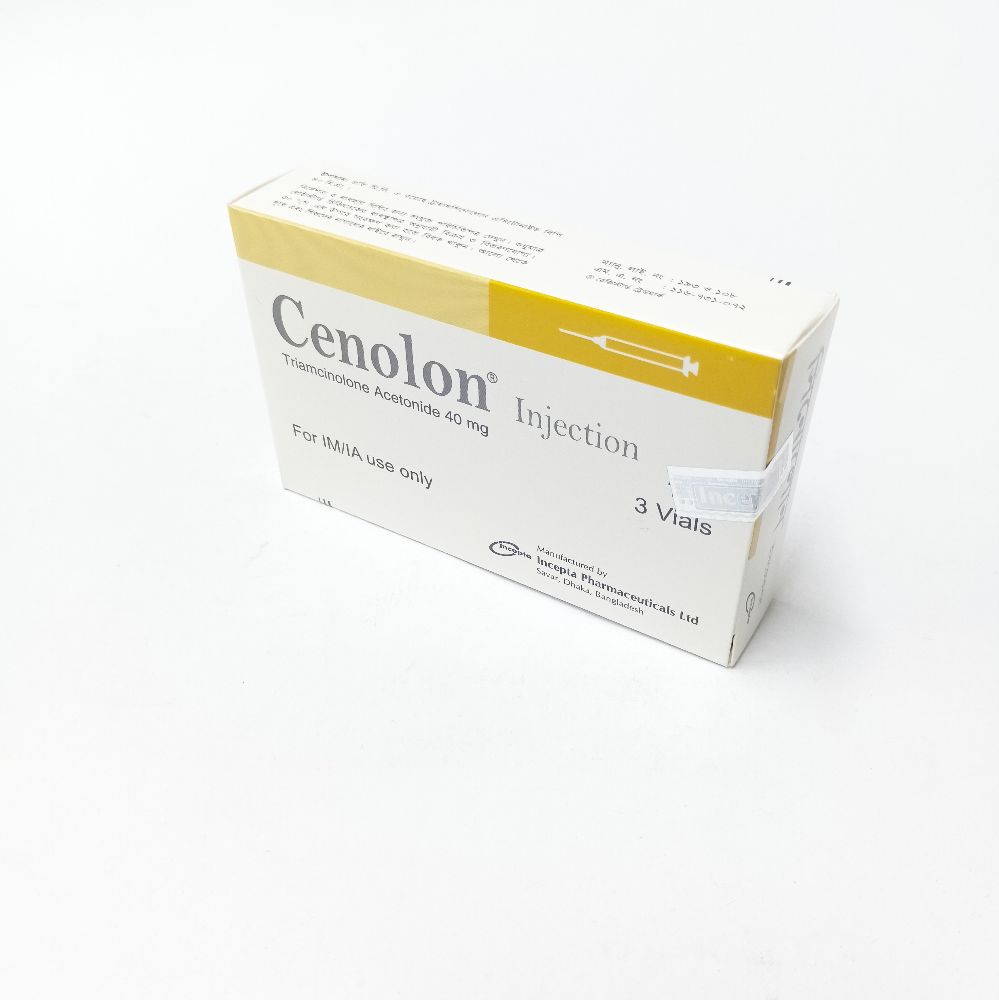
Type:3 Injections
Generic Name:Triamcinolone Acetonide
Manufacturer:Incepta Pharmaceuticals Ltd.
Price:৳225.00
Allergic and inflammatory responses, Inflammatory joint disease, Inflammatory skin conditions
Dilute with local anesthetic (1% or 2% lidocaine without parabens) before intra-articular or intralesional injection Dilute with D5/NS or D10/NS or NS or SWI before intralesional injection
Intramuscular Suppression of allergic and inflammatory disorders Adult: As acetonide: 20-80 mg via deep IM into gluteal muscles. Symptomatic control for hay fever Adult: As acetonide: 40-100 mg via deep IM into gluteal muscles. Rheumatic or arthritic disorders Adult: 60 mg IM every 6 weeks; may be supplemented by additional 20-100 mg IM PRN Intra-articular Inflammatory joint diseases Adult: As acetonide: Smaller joints: 2.5-5 mg (up to 10 mg), larger joints: 5-15 mg (up to 40 mg). Max: 20-80 mg/treatment. Intradermal Inflammatory skin conditions Adult: As acetonide: 1-3 mg/site. Max: 30 mg in total if several sites of inj used. Max: 12.5 mg/inj site. Max: 25 mg/lesion.
Intramuscular Suppression of allergic and inflammatory disorders Child: As acetonide: deep IM into gluteal muscle: initial 0.11 to 1.6 mg/kg/day in 3-4 divided doses. Do not use in premature infants and infants of low birth weight as it contains benzyl alcohol. Child: 6-12 years: 0.03-0.2 mg/kg IM every 1-7 days >12 years: 60 mg IM every 6 weeks; may be supplemented by additional 20-100 mg IM PRN >12 years, intralesional injection (10 mg/mL suspension): 1 mg per injection site 1 or more times weekly; not to exceed 30 mg/day Symptomatic control for hay fever Child: As acetonide: deep IM into gluteal muscle: initial 0.11 to 1.6 mg/kg/day in 3-4 divided doses. Do not use in premature infants and infants of low birth weight as it contains benzyl alcohol.
Triamcinolone Acetonide is contraindicated in patients with a sensitivity to the active or inactive ingredients. Untreated systemic fungal, bacterial, viral or parasitic infection, hypersensitivity. Neonates (Parenteral)
Triamcinolone has mainly glucocorticoid activity. It suppresses the migration of polymorphonuclear leukocytes and reduces capillary permeability thereby decreasing inflammation.
Diabetes; hypertension, renal and liver impairment; glaucoma; psychosis; delayed tissue healing; cirrhosis; heart failure; recent MI; hypothyroidism; osteoporosis; peptic ulceration; thromboembolic disorders. Monitor height in children on prolonged therapy. Avoid rapid drug withdrawal. Elderly, children, pregnancy, lactation. Lactation: Excreted in breast milk; use caution
HPA axis supression, intracranial hypertension, Cushing's syndrome, growth retardation in children; osteoporosis, fractures. Peptic ulceration; glaucoma; hyperglycaemia; GI upsets; increased appetite; increased fragility of skin; behavioural changes. Potentially Fatal: Acute adrenal insufficiency may be precipitated by infection or trauma in patients on long-term corticosteroid therapy or rapid withdrawal.
Lowering of plasma salicylates levels. Increased risk of GI bleeding and ulceration with NSAIDs. Antagonised blood glucose-lowering effects of the antidiabetics. Increased risk of hyperkalaemia with amphotericin B, beta agonists, beta-blockers, potassium-depleting diuretics, theophylline. Increased clearance of the triamcinolone with ciclosporin, carbamazepine, phenytoin, barbiturate, rifampicin. Infections may develop if given with live vaccines.